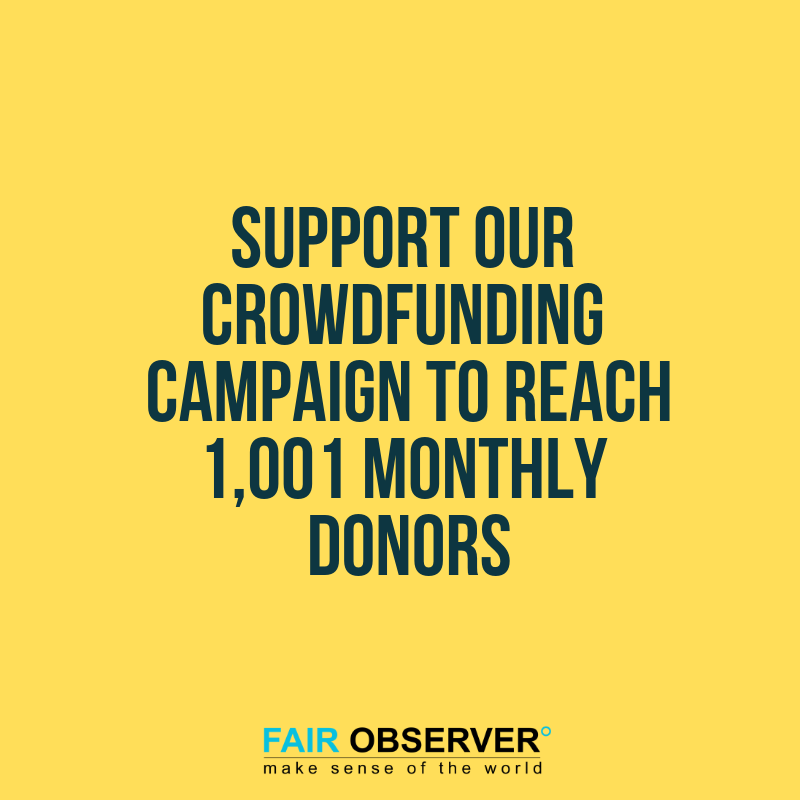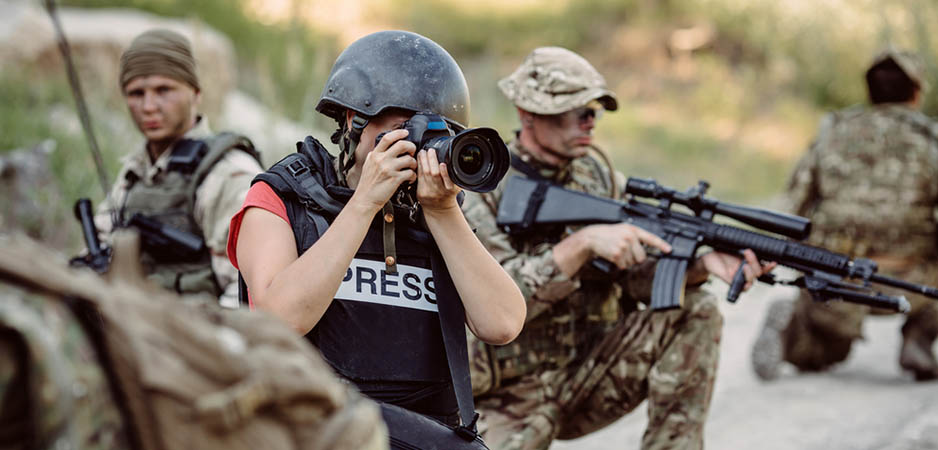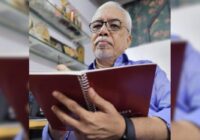In this edition of The Interview, Fair Observer talks to Robert S. Boynton, director of the Literary Reportage program at New York University.
Being a journalist is not an easy job. It has never been seen as an effortless and unproblematic profession. Journalists go to extreme lengths to report on sensitive and controversial issues in the public interest. They may find themselves personally engaged with the stories they cover and even risk their own wellbeing being affected by the amount of stress and anxiety.
According to CareerCast, a job search engine, the role of a newspaper reporter is the sixth most stressful job in the world. So far this year, at least 45 journalists have been killed in line of duty, as reported by the Committee to Protect Journalists.
Hundreds of broadcast, print and online media organizations are run by people who are on a mission to promote their own narrative of current affairs. The wide variety of organizations has made it increasingly difficult for global audiences to find the most reliable and authentic sources of information. People often ask how they can verify a breaking news story as reported by several news outlets.
Aside from being loathed by authoritarian governments, media professionals face many challenges. These include how to expand their popular base and reach a wider audience, how to better package their stories, and how to win the rivalry with competing media organizations.
In this edition of The Interview, Fair Observer talks to Professor Robert S. Boynton of New York University about the challenges of journalism, independent media and the competition between news organizations.
The transcript has been edited for clarity.
Kourosh Ziabari: Free press and independent media are under attack these days. People in authority in the developing world and the developed world alike blame the media for their shortcomings, failures and mismanagement. How is it possible to protect the media and journalists facing disparagement from people in power?
Robert S. Boynton: Other than during periods of actual war, there has never been a time when it is so dangerous to be a journalist. Journalists are no longer viewed as neutral actors, and are murdered and kidnapped by terrorist organizations such as ISIS and nation states like Saudi Arabia. There is no single fix for this situation, but there are several discrete actions that might make help.
First, the United Nations should go beyond its previous attempts to keep journalists safe, and treat crimes against journalists in the same way it deals with other violations of human rights. Specifically, that would mean opening investigations into the murder of journalists like Jamal Khashoggi. In other words, international crimes against journalists should be considered along with other war crimes.
Ziabari: Is ethical journalism and the application of media ethics growing or declining? While media organizations are on a quest for financial resources and new benefactors to help them be sustainable, do you think the principles of ethics and good practice are being compromised?
Boynton: The pressures of the market have always worked in opposition to media ethics. With the breakdown of the traditional business model, journalism organizations are under more pressure than ever to make money, regardless of the ethical consequences. I see no “solution” to this other than improving the business model so that institutions feel less threatened. The move from advertiser-based to reader or consumer-based models is a positive development. Making journalism answerable to those who consume it may help the overall ethical atmosphere in which journalism is created.
Ziabari: Who is going to be the winner in the race between the mainstream media and alternative media? Do the resources owned by the mainstream media make them more likely to win the competition, despite their coverage not always being the most reliable and truthful?
Boynton: The digital revolution has shown that mainstream or traditional media companies are vulnerable. This is evident in the changes that have occurred in music production, print publishing, audio and broadcast. The mainstream vs. alternative media distinction is meaningless in this context. Organizations that take the digital threat seriously have a chance of surviving and evolving. Those that don’t, won’t.
Ziabari: What do you think can be done to help journalists working under authoritarian regimes have their voices heard and overcome the challenges of reporting under state-sanctioned pressure and censorship?
Boynton: A journalist working in an authoritarian regime is in an impossible situation. If he satisfies the censors, he is compromised. If it offends them, he is in danger. I’m most familiar with this tension in the case of North Korea, which is the closest thing in the world today to a totalitarian regime. There is no mainstream journalism inside North Korea that is worth consuming. However, a small number of covert journalists have been able to operate with the aid of organizations in South Korea, Japan and elsewhere.
This leads me to the conclusion that the only hope for legitimate journalism in an authoritarian regime is with the aid of outside groups. Ultimately, there is no solution to the dilemma of a journalist working in an authoritarian regime other than the regime’s downfall, or the journalist’s exile. Publishing anonymously with the aid of outside groups is a stop-gap.
 Ziabari: Do you think it’s particularly difficult for emerging journalists in the developing world to become internationally-renowned media personalities, have their works published in major publications, and join famous newsrooms and work with experienced peers from the developed world?
Ziabari: Do you think it’s particularly difficult for emerging journalists in the developing world to become internationally-renowned media personalities, have their works published in major publications, and join famous newsrooms and work with experienced peers from the developed world?
Boynton: This question assumes that the system of mainstream journalism is operating much the way it did 20 or 30 years ago. The challenge today is less to get one’s work out to the rest of the world, and more to get anyone to pay attention. If someone’s work is good, it has never been so easy to get it to the so-called outside world. The system according to which it is possible for one to become “famous” in the media wasn’t ever really a “system,” and certainly no longer works today.
That said, there is a route for serious journalism that never existed before. Again, my reference is North Korea, and publications like NK News and the Daily NK, which have created a market for reliable, well-reported, well-presented news about conflict on the Korean Peninsula. Will they make its writers “famous”? That is doubtful. But they are producing high-level journalism in a way that would have been unthinkable even a decade ago, and that is a reason for optimism.
Ziabari: What traits make a piece of journalism professional and objective? How much of the journalism produced today is professional and reliable according to these standards?
Boynton: I don’t find the word “objective” very helpful when applied to journalism for reasons my colleague, Jay Rosen, has explored for years. What he calls “the view from nowhere” is just that: a false view that makes false claims by drawing on faulty philosophical concepts. A “professional” journalist is someone who produces “professional” journalism, which is to say journalism that is read and valued by those in a position to evaluate and appreciate it. The work can appear in any form: a blog, newsletter, newspaper, audio podcast, magazine article or book. The medium is of no importance.
I can tell you who the better and worse “professional” journalists are who write about East Asia in general, and North Korea in particular. I spent a decade studying the area and know what I am talking about, at least in terms of the journalism devoted to the subject. I do not have the final word, but my judgment is worth more than someone who knows nothing about the subject. That dynamic replicates itself in every subject covered by journalism, and is ultimately the way that the distinction between “professional” and “unprofessional” work is made. There is no shortcut.
Ziabari: As a journalism professor, what’s the most notable challenge for you teaching and working with students of different nationalities? How do you balance your expectations and their needs so as to offer them high-quality training and education in media and journalism?
Boynton: The kind of journalism I teach relies on students who must be fluent in their language. It is, therefore, difficult to teach a student who is incredibly bright in his or her own language, but whose mastery of English is lacking. Ultimately, most of them want to pursue careers in their home countries, so I try to make sure to convey the conceptual work of literary reportage, without judging them according to their English.
An international journalist who has mastered the English language is an incredibly exciting student to work with. There are no limits to what he or she can achieve, given the possibilities of print and audio.
Ziabari: There are thousands of TV and radio stations, newspapers and social media networks operating across the world that relay news and information in big proportions. How should people choose media outlets to get the latest news and most authentic analysis and commentary from?
Boynton: Start from the justly venerated sources such as The New York Times, the BBC, The Economist, NPR and work from there. There are infinite outlets for niche subjects, and only someone who knows about those subjects can judge a particular one’s quality. There is a temptation to lose track of the larger narrative and focus on the niche that should be resisted. It is important to be familiar with the background beliefs that inform global media, and those are best found in large media organizations, whether you like them or not. One should be skeptical of mainstream media, but shouldn’t ignore the journalism it produces.
The views expressed in this article are the author’s own and do not necessarily reflect Fair Observer’s editorial policy.
Support Fair Observer
We rely on your support for our independence, diversity and quality.
For more than 10 years, Fair Observer has been free, fair and independent. No billionaire owns us, no advertisers control us. We are a reader-supported nonprofit. Unlike many other publications, we keep our content free for readers regardless of where they live or whether they can afford to pay. We have no paywalls and no ads.
In the post-truth era of fake news, echo chambers and filter bubbles, we publish a plurality of perspectives from around the world. Anyone can publish with us, but everyone goes through a rigorous editorial process. So, you get fact-checked, well-reasoned content instead of noise.
We publish 2,500+ voices from 90+ countries. We also conduct education and training programs
on subjects ranging from digital media and journalism to writing and critical thinking. This
doesn’t come cheap. Servers, editors, trainers and web developers cost
money.
Please consider supporting us on a regular basis as a recurring donor or a
sustaining member.
Will you support FO’s journalism?
We rely on your support for our independence, diversity and quality.






